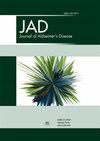对患有幼年痴呆症的疗养院居民进行姑息治疗:专业人士和家庭护理者的观点
IF 3.4
3区 医学
Q2 NEUROSCIENCES
引用次数: 0
摘要
背景:支持痴呆症姑息关怀的证据大多基于对老年人群的研究。人们对年轻痴呆症(YOD)患者的姑息关怀需求知之甚少。目的描述居住在荷兰疗养院的年轻痴呆症患者的姑息治疗实践,包括预先护理计划(ACP)。方法:本研究采用基线问卷调查的方式,对荷兰养老院中的年轻痴呆症患者进行姑息治疗:本研究提供了一项观察性队列研究的基线问卷数据。医生、家庭护理人员和护理人员填写了有关 185 名 YOD 患者的调查问卷。问卷内容包括社会人口统计学、晚期痴呆症生活质量量表(QUALID)测量的生活质量、痴呆症相关的躯体健康问题、症状、止痛药物、精神药物和 ACP。研究结果患者平均年龄为 63.9 岁(标准差为 5.8 岁)。半数(50.3%)为女性。阿尔茨海默病痴呆(42.2%)是最常见的亚型。根据家庭护理人员的评估,QUALID 的平均得分为 24.0 分(标准差为 7.9 分),根据护理人员的评估,平均得分为 25.3 分(标准差为 8.6 分)。吞咽困难是最常见的痴呆症相关健康问题(11.4%)。躁动是医生(42.0%)和护理人员(40.5%)经常报告的问题。精神药物是常用处方(72.3%)。少数患者有书面预嘱(5.4%)或前全科医生的治疗偏好文件(27.2%)。整体护理目标通常以舒适为重点(73.9%)。除住院治疗和抗生素外,所有干预措施的拒绝治疗指令比例均高于同意治疗指令。结论:必须在入住疗养院之前尽早启动 ACP。即使入住者相对年轻,并且很少遇到与痴呆症相关的健康问题,姑息治疗方法似乎也是合适的。本文章由计算机程序翻译,如有差异,请以英文原文为准。
Palliative Care in Nursing Home Residents with Young-Onset Dementia: Professional and Family Caregiver Perspectives
Background: The evidence underpinning palliative care in dementia is mostly based on research in older populations. Little is known about the palliative care needs of people with young-onset dementia (YOD). Objective: To describe palliative care practices including advance care planning (ACP) in people with YOD residing in Dutch nursing homes. Methods: The study presents baseline questionnaire data from an observational cohort study. Physicians, family caregivers, and nursing staff completed questionnaires about 185 residents with YOD. The questionnaires included items on sociodemographics, quality of life measured with the quality of life in late-stage dementia (QUALID) scale, dementia-related somatic health problems, symptoms, pain medication, psychotropic drugs, and ACP. Results: The mean age was 63.9 (SD 5.8) years. Half (50.3%) of them were female. Alzheimer’s disease dementia (42.2%) was the most prevalent subtype. The mean QUALID score was 24.0 (SD 7.9) as assessed by family caregivers, and 25.3 (SD 8.6) as assessed by the nursing staff. Swallowing problems were the most prevalent dementia-related health problem (11.4%). Agitation was often reported by physicians (42.0%) and nursing staff (40.5%). Psychotropics were prescribed frequently (72.3%). A minority had written advance directives (5.4%) or documentation on treatment preferences by the former general practitioner (27.2%). Global care goals most often focused on comfort (73.9%). Proportions of do-not-treat orders were higher than do-treat orders for all interventions except for hospitalization and antibiotics. Conclusions: ACP must be initiated earlier, before nursing home admission. A palliative approach seems appropriate even though residents are relatively young and experience few dementia-related health problems.
求助全文
通过发布文献求助,成功后即可免费获取论文全文。
去求助
来源期刊

Journal of Alzheimer's Disease
医学-神经科学
CiteScore
6.40
自引率
7.50%
发文量
1327
审稿时长
2 months
期刊介绍:
The Journal of Alzheimer''s Disease (JAD) is an international multidisciplinary journal to facilitate progress in understanding the etiology, pathogenesis, epidemiology, genetics, behavior, treatment and psychology of Alzheimer''s disease. The journal publishes research reports, reviews, short communications, hypotheses, ethics reviews, book reviews, and letters-to-the-editor. The journal is dedicated to providing an open forum for original research that will expedite our fundamental understanding of Alzheimer''s disease.
 求助内容:
求助内容: 应助结果提醒方式:
应助结果提醒方式:


